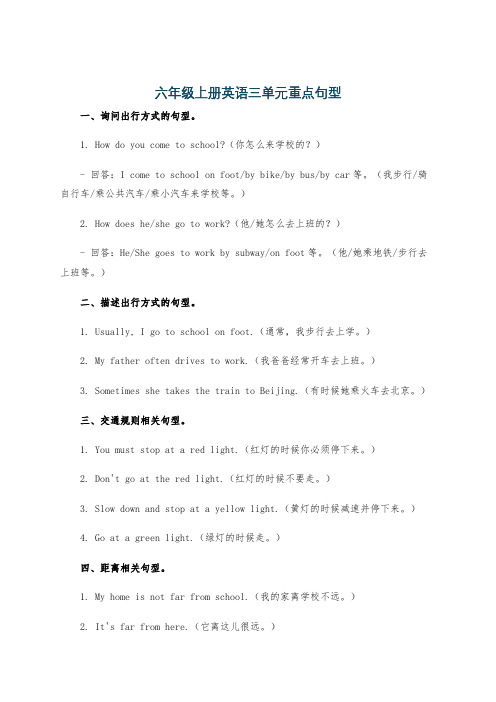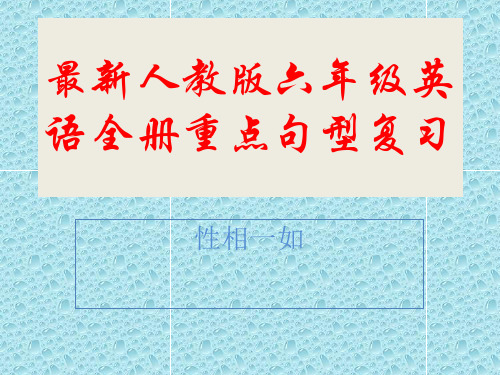六年级上册主要句型复习
- 格式:doc
- 大小:28.50 KB
- 文档页数:2

PEP六年级上册四会单词及句子复习Unit1第一单元四会单词:Sciencemuseum科学博物馆postoffice邮局bookstore书店cinema电影院hospital医院crossing十字路口turnleft向左转gostraight直走turnright向右转四会句子:1--Whereisthemuseumshop博物馆的商店在哪儿--It`snearthedoor在大门附近2--Howcanwegetthere我们怎么到那儿--Turnleftatthebookstore到书店左转Unit2第二单元四会单词:onfoot走路bybus乘公共汽车bytaxi乘出租车byplane乘飞机bysubway乘地铁byship乘船bytrain乘火车slowdown减速stop停下wait等go走四会句子:1--Howdoyoucometoschool你怎么来学校的--Usually,Icomeonfoot通常我走路来2IntheUSApeopleonbikesmustwearone.在美国骑自行车的人必须戴头盔;3 Don’tgoattheredlight别闯红灯;4Imustpayattentiontothetrafficlights我必须注意交通信号灯Unit3第三单元四会单词:visitmygrandparents拜访我的外祖父母seeafilm看电影takeatrip远行gotothesupermarket去超市dictionary词典comicbook连环画书wordbook单词书postcard明信片四会句子:1--Whatareyougoingtodotomorrow你明天打算做什么--I’mgoingtohaveanartlesson.我要上美术课2 We’regoingtodrawsomepicturesinRenminPark.我要到人民公园去画画3--Whereareyougoing你们打算去哪儿--We`regoingtothecinema我们打算去电影院4Whenareyougoing你们什么时候去Unit4第四单元四会单词:dancing跳舞singing唱歌readingstories看故事书playingfootball踢足球doingkungfu打功夫cooksChinesefood做中国菜studiesChinese学习汉语doeswordpuzzles猜字谜goeshiking远足四会句子:1--WhatarePeter`shobbies彼得有什么爱好--Helikesreadingstories他喜欢读故事2--DoesheliveinSydney他住在悉尼吗--No,hedoesn`t不,他没有3--Doeshelikedoingwordpuzzlesandgoinghiking他喜欢猜字谜和远足吗--Yes,hedoes是的,他喜欢Unit5第五单元四会单词:factoryworker工厂工人postman邮递员businessman生意人policeofficer警察fisherman渔民scientist科学家pilot飞行员coach教练四会句子:1--Whatdoeshedo他是做什么的--Heisabusinessman.他是商人2--Wheredoeshework他在哪儿工作--Heworksatsea.他在海上工作;3--Howdoeshegotowork他怎么上班--Hegoestoworkbybike.他骑自行车上班;Unit6第六单元四会单词:angry生气的afraid害怕的sad悲伤地worried担心的happy开心的seeadoctor看医生domoreexercise做更多的锻炼takeadeepbreath深深吸一口气wearwarmclothes穿暖和的衣服counttoten数到十四会句子:1 They’reafraidofhim.它们害怕它2Thecatisangrywiththem.这只猫生它们的气;3What`swrong怎么了Yourfatherisill.你爸爸生病了;4Heshouldseeadoctorhismorning.他今天早上应该去看病;5Don`tbesad.别伤心PEP六年级上册常用句型问路和指路-Whereis+地点名词……在哪儿-It’s+介词短语.在……;-Howcanwe/Igetto...我们/我怎么到……呢-Turnleft/right./Gostraight./Youcangoby+交通工具.左/右转;直走;/你可以乘坐……去那儿;询问并回答对方来或去某地的交通方式:Howdoyoucome/goto+地点你/你们怎么来/去……I/Wecome/goto+地点+bybike/onfoot….我/我们骑自行车/步行……来/去……询问对方某个时间打算做某事的句型及答语:-Whatareyougoingtodo+表示将来的时间你……打算去做什么-I’mgoingto+动词原形+将来的时间.我打算……去做……询问对方打算去哪儿的句型及答语:Whereareyougoing+表示将来的时间你……打算去哪儿I’mgoingto+表示地点的名词.我打算……去….询问对方打算什么时候去做某事的句型及答语:Whenareyougoing+动词原形你打算什么时候去……Iamgoingto+动词原形+将来时间.我打算……去……;注:begoingto+动词原形=will+动词原形询问别人的爱好并作出回答:Whatis/are某人的hobby/hobbies……有什么爱好=Whatdo/does某人like主语+like/likes+动词-ing+其他.……喜欢做……=某人的hobby is/are….某人的爱好是...;助动词does引导的一般疑问句及答语:Does+第三人称单数主语+动词原形+其他……做……吗-Yes,he/she/itdoes.No,he/she/itdoesn’t.是的,他/她/它是;不,他/她/它不是;询问他人的职业并作出回答:Whatdo/does+主语+do......是做什么的=Whatbe+某人主语+be动词+a/an+职业名词.……是……询问他人的工作地点并作出回答:Wheredo/does+主语+work……在哪儿工作主语+work/works+表示地点的副词或介词短语;……在……工作;询问他人怎么去上班:Howdo/does+主语+gotowork主语+gotowork+bybike/onfoot….询问他人正在做什么及描述正在做某事:What+be+某人+doing主语+be动词+动词-ing+其他….正在…Don’t祈使句:Don’t+动词原形+其他.不要……Don’t+be+形容词+其他.不要……表达对某人或某事的关心:What’wrongwith+某人描述及提问某人的感受的句型:How+do/does某人+feel主语+feel/feels+表示感受的形容词+其他.=主语+be动词+表示感受的形容词+其他.……是……用should来给对方提建议及征求意见的句型:Whatshould某人+do某人should+动词原形.你应该…..语法复习一、现在进行时态3种变化规律1.直接加ing:do—doing draw—drawing cook—cooking answer—answering read—reading listen—listening fly—flying sing—singing play—playing2.去掉末尾的e加ing:write—writing dance—dancing take—taking have—having make—making ride—riding dive—diving3.双写末尾字母加ing:get—getting run—running swim—swimming sit—sitting put—putting你正在干什么WhatareyoudoingI’mansweringthephone.他/她/它正在干什么Whatishe/she/itdoingHe’s/She’s/It’s …他她、它们正在干什么WhataretheydoingTheyare…看到like或likes后面的动词要加上ing二、一般将来时态begoingto/will+动词原形表示一般将来时的时间状语有:thismorning,thisafternoon,thisevening,tomorrow,tonight,thisweekend,ontheweekend,nextweek,nextmonth,nextyear,nextweekend.例:今晚你将要做什么Whatareyougoingtodothisevening—I’mgoingtothecinema.I’mgoingtovisitmygrandparents.你将什么时候去Whenareyougoing—I’mgoingat7:10.你将怎样去呢Howareyougoing—I’mgoingbybus.今天下午你将要去哪里Whereareyougoingthisafternoon—I’mgoingtothebookstore.你将要买什么呢WhatareyougoingtobuyI’mgoingtobuyacomicbook.你将和谁一起去WhoareyougoingwithI’mgoingwithmyparents.三、第三人称单数后面的动词要加s或es1.一般情况加s,如:read—reads;live—lives;play—plays;sing—sings2.动词末尾以s,x,ch,sh或部分以o结尾的加es记住课本中出现的这几个:watches,teaches,goes,does,washes,passes3.辅音字母+y结尾的把y变i再加es,如:fly—flies;study—studies4.特殊情况:have--has5.第三人称单数包括:he;she;it;myfather/friend;Amy/Hangzhou等一个人名或地名;例如:Helikesdrawingpictures.Sheworksinacarcompany.Itcomesfromtheclouds.Myfathergoestoworkonfoot.LiLeioftenplayscomputergamesafterlunch.6.一般疑问句记住:前面助动词加了es,后面动词就不变化了;如:DoessheteachEnglishDoesyourpenpalliveinHangzhou四、不定冠词a和an的用法a用于辅音因素开头的单词前;an用于元音因素开头的单词前;记住课本中出现的要用an的单词:anactor;anactress;anartist;anengineer;anaccountant;anEnglishbook;anorange;anapple;anoldwoman五、动词变化为表示职业或人的单词1.动词后面加er:work—worker;teach—teacher;sing—singer;TV report—TVreporterclean—cleaner2.动词后面加or:act—actor;doctor3.末尾以e结尾的直接加r:write—writer;dance—dancer;drive—driver4.动词后面加ist:art—artist;tour—tourist5.职业男女有区别的:警察policeman—policewoman;演员actor—actress六、8个疑问词which哪一个what什么when什么时候where哪里whose谁的why为什么how怎么样who谁七、人称代词和物主代词I—my-mine我—我的-我的you—your-yours你;你们—你的;你们的-你的;你们的he—his-his他—他的-他的she—her-hers她—她的-她的we—our-ours我们—我们的-我们的they—their-theirs他们/她们/它们—他们的/她们的/它们的他们的/她们的/它们的八、can后面加动词原形WhatcanyoudoIcancookthemeals.Hecanflykites.Shecan playtheviolin.弹小提琴PEP小学英语六年级上册各单元作文一、介绍你和家人上学或上班的方式Igotoschoolonfoot.Mysistergoestoschoolonfoot,too.Mybrothergoestoschoolby bike.Myfathergoestoworkbycar.Mymothergoestoworkbybike.二、看图,说说你怎样去电影院Igotothecinema.Istartfromhere.Gostraightforfiveminutes.Thenturnleftatthe library.Gostraightforoneminute.Thelibraryisontheright.三、读读下周末你和朋友的计划I’mgoingtohaveabusyweekendwithmyfriends.OnSaturdaymorning,wearegoingtog oshpping.OnSaturdayafternoon,wearegoingtothepark.OnSundaymorning,wearego ingtogofishing.OnSundayafternoon,wearegoingtoflykites.Wewillbehappy.四、说说你和你家人的爱好;Ilikeflyingkites.Myfatherlikesdiving.Mymotherlikesplayingthepipa.Mybroth erlikesridingabike.Mysisterlikeslisteningtomusic.MyfriendJohnlikesflying kites.Amylikescollectingstamps.ZhangPenglikesplayingfootball.ChenJielike sridingabike.五、介绍你一家人的职业和上班地点和方式;Myfatherisateacher.Heworksinaschool.Hegoestoworkbycar.Mymotherisanaccoun tant.Sheworksinabank.Shegoestoworkbybus.六、写一封信给你的笔友,介绍你一家人的情况;DearAmy,MynameisSarah.I’m13.I’mtallandthin.Ilikeswimming.Myfatheris40.He’stal landstrong.Helikesreadingbooks.Heisworker.Heworksinafactory.Hegoestowork bycar.M ymotheris39.She’sshortandthin.Shelikescooking.Sheworksinabooksto re.Shegoestoworkonfoot.Yours,Sarah七、看图介绍图中这个人的情况;HeisBen.Heis26.Heisapoliceman.Hegoestowork bybus.Helikesplayingtheviolin.Helikesgoingfishing,too.。

六年级课文复习重点句型梳理一、表示欢迎与问候的句型:1. Welcome back! We've missed you during your absence.欢迎回来!我们在你离开期间都想着你。
2. How have you been? I hope everything is going well.最近过得好吗?希望一切都顺利。
3. It's good to see you again! How was your trip?很高兴再次见到你!你的旅行怎么样?4. Nice to meet you! I've heard so much about you.很高兴见到你!我听说过很多关于你的事情。
5. Hello! How are you doing? Long time no see.你好!最近怎么样?好久不见了。
6. Welcome to our school! We hope you enjoy your stay here.欢迎来到我们学校!希望你在这里过得愉快。
二、询问与表达个人信息的句型:1. What's your name? Mine is Rachel.你叫什么名字?我叫蕾切尔。
2. How old are you? I'm twelve years old.你几岁了?我12岁。
3. Are you a student? Yes, I am. I go to Westwood Elementary School.你是学生吗?是的,我是。
我在西木小学上学。
4. Where do you live? I live in the Green Meadows neighborhood.你住在哪里?我住在绿草地社区。
5. Do you have any hobbies? Yes, I enjoy playing soccer and painting.你有什么爱好吗?是的,我喜欢踢足球和画画。

六年级上册英语三单元重点句型一、询问出行方式的句型。
1. How do you come to school?(你怎么来学校的?)- 回答:I come to school on foot/by bike/by bus/by car等。
(我步行/骑自行车/乘公共汽车/乘小汽车来学校等。
)2. How does he/she go to work?(他/她怎么去上班的?)- 回答:He/She goes to work by subway/on foot等。
(他/她乘地铁/步行去上班等。
)二、描述出行方式的句型。
1. Usually, I go to school on foot.(通常,我步行去上学。
)2. My father often drives to work.(我爸爸经常开车去上班。
)3. Sometimes she takes the train to Beijing.(有时候她乘火车去北京。
)三、交通规则相关句型。
1. You must stop at a red light.(红灯的时候你必须停下来。
)2. Don't go at the red light.(红灯的时候不要走。
)3. Slow down and stop at a yellow light.(黄灯的时候减速并停下来。
)4. Go at a green light.(绿灯的时候走。
)四、距离相关句型。
1. My home is not far from school.(我的家离学校不远。
)2. It's far from here.(它离这儿很远。
)- 可以接着说:We can go by bus/We should take a taxi等(我们可以乘公共汽车去/我们应该乘出租车等)。

六年级上册各单元句子集(一)要求:每天读一读一、核心句型【Unit1】①问“某地在哪里”:Where is the + 地点?回答:It’s + 表示地点的介词短语Where is the museum shop ? 博物馆商店在哪里?It’s near the door .它在门旁边。
②问路:How can we / I get to + 地点?指路:Turn left / right / go straight + at + 地点How can we get to the cinema ? 我们怎样到达电影院?How can I get there ? 我怎样到那里?Turn left at the crossing, then go straight . 在十字路口左转,然后直走。
【Unit2】①问上学的交通方式:How do you come to / go to school ?回答:I come / go + 交通方式(表达交通方式:by + 交通工具)②交通规则(traffic rules):We must pay attention to the traffic light s. 我们必须注意交通信号灯。
Slow down and stop at a yellow light . 黄灯时要减速慢行并停下来。
Stop and wait at a red light . 红灯停并等待。
Go at a green light .绿灯行。
Don’t go at a red light . 不要闯红灯。
【Unit3】▲be going to 句型表示“准备,打算干什么”,常和表示将来的时间连用。
①What are you going to do this weekend ? 这个周末你准备干什么?I am going to go on a picnic . 我要去野餐。
We are going to draw some pictures in Renmin Park . 我们要在人民公园画画。


六年级上册语法句型知识点一、句子的基本构成句子是由主语和谓语构成的,主语是句子中的主要内容(人、事物或概念),谓语则表示主语的动作、状态或存在形式。
除了主语和谓语,句子中还可以含有其他成分如宾语、定语、状语等。
二、简单句和复合句1. 简单句:简单句只由一个主谓结构组成,表达一个完整的含义。
例:他跑得很快。
2. 复合句:复合句由一个主句和一个或多个从句组成。
(1) 名词性从句:名词性从句可以在句中作主语、宾语、表语或同位语。
例:我知道他在哪里。
(主语从句)他告诉我他会来。
(宾语从句)(2) 定语从句:定语从句用于修饰名词或代词,加强其修饰力。
例:我喜欢那本在桌子上的书。
(修饰名词"书")(3) 状语从句:状语从句修饰谓语,表示时间、原因、条件、目的、比较、方式等。
例:我们不能出去,因为下雨了。
(修饰谓语"不能出去")如果你努力学习,就会取得好成绩。
(修饰谓语"会取得好成绩")三、句型分类1. 主谓句型:例:小明看电视。
2. 动宾句型:例:她买了一个漂亮的花瓶。
3. 主语补语句型:例:他是一名优秀的篮球运动员。
4. 宾语补语句型:例:我觉得这个问题很有趣。
5. 比较句型:例:他比我高一些。
6. 祈使句型:例:请你给我一杯水。
7. 特殊疑问句型:例:你是谁?8. 一般疑问句型:例:你喜欢吃苹果吗?9. 肯定回答句型:例:是的,我喜欢。
10. 否定回答句型:例:不,我不喜欢。
四、语序汉语的一般语序是主谓宾的顺序,但在特殊情况下可以改变语序。
1. 倒装句:(1) 完全倒装句:例:永远不要放弃梦想。
(强调句)例:倒车时,请小心。
(祈使句)(2) 部分倒装句:例:这里有几本书。
(句子的部分成分提前)例:他们去了公园。
(谓语提前)2. 疑问句:例:你是什么时候去的?3. 否定句:例:我不喜欢游泳。
五、连词的使用连词可以连接单词、短语或句子,使句子成为一个整体。
小学六年级英语(上册)知识归纳|人教版Unit 1 How do you go to school?一、重点短语:by plane 坐飞机by ship 坐轮船on foot步行by bike 骑自行车by bus 坐公共汽车by train 坐火车trafficlights交通灯traffic rules交通规则go to school 去上学get to 到达get on上车get off下车Stop at a red light. 红灯停Wait at ayellow light. 黄灯等Go at a green light. 绿灯行二、重点句型:1.How do you go to school?你怎么去上学?ually I go to school on foot. SometimesI go by bus.通常我步行去上学。
有时候骑自行车去。
3.How can I get to Zhongshan Park ?我怎么到达中山公园?4.You can go by the No. 15 bus. 你可以坐15路公共汽车去。
三、重点语法:1、There are many waysto go somewhere.到一个地方去有许多方法。
这里的ways一定要用复数。
因为there are是There be句型的复数形式。
2、on foot 步行乘坐其他交通工具大都可以用介词by…,但是步行只能用介词on 。
4、go to school的前面绝对不能加the,这里是固定搭配。
5、USA 和US 都是美国的意思。
另外America也是美国的意思。
6、go to the park 前面一定要加the. 如果要去的地方有具体的名字,就不能再加the ,如果要去的地方没有具体名字,都要在前面加the. (go to school除外。
)7、How do you go to …?你怎样到达某个地方?如果要问的是第三人称单数,则要用:How does he/she…go to …?8、反义词:get on(上车)---get off(下车)near(近的)—far(远的)fast(快的)—slow(慢的)because(因为)—why(为什么)same(相同的)—different(不同的)9、近义词:see you---goodbye sure---certainly---ofcourse10、频度副词:always 总是,一直usually 通常often经常sometimes 有时候never 从来不Unit 2 Where is the science museum?一、重点短语:library 图书馆post office 邮局hospital医院cinema 电影院bookstore书店science museum科学博物馆turnleft向左转turn right 向右转go straight 直行north北south南east东west西next to靠近、与……。
六年级上册英语常用句式一、陈述句(1)肯定句:是指用肯定的语气来陈述的句子,如:1.I’m a student.2.She is a doctor.3.He works in a hospital.4.There are four fans in our classroom.5.He will eat lunch at 12:00.6.I watched TV yesterday evening.(2)、否定句:含有否定词或表示否定意义词的句子,如:1.I’m not a student.2.She is not (isn’t) a doctor.3.He does not (doesn’t) work in a hospital.4.There are not (aren’t) four fans in our classroom.5.He will not (won’t) eat lunch at 12:00.6.I did not (didn’t) watch TV yesterday evening.二、疑问句一般疑问句:是指询问事实的句子,此类句子必须用“yes”,或“no”来回答。
特殊疑问句:以特殊疑问词(what,where,who,which,when,whose,why,how等)开头引导的句子。
此类句子应该问什么就答什么,不能用“yes 、no”来回答。
三、There be句型There be 句型与have, has的区别There be 句型表示:在某地有某物(或人)在there be 句型中,主语是单数,be 动词用is ; 主语是复数,be 动词用are ; 如有几件物品,be 动词根据最接近be动词的那个名词决定。
1.there be 句型的否定句在be 动词后加not , 一般疑问句把be 动词调到句首。
2.there be句型与have(has) 的区别:there be 表示在某地有某物(或人);have(has) 表示某人拥有某物。
六年级上册英语重点句型归纳Unit 11.How do you go to school? 你是怎样去上学的?2.where is the restaurant? 餐馆在哪里?3. Usually I go to school on foot. 我通常走路去上学。
4. Sometimes I go by bike. 有时候我骑自行车去。
5. 问路之前,出于礼貌,我们要说“Excuse me”与后面的句子要用标点符号隔开。
6.Look at the traffic lights, remember the traffic rules.看着交通灯,记住交通规则。
7.Stop at a red light.Wait at a yellow light. Go at a green light. 红灯停。
黄灯等一等。
绿灯行。
8.Red means stop, yellow means wait, green means go.红色的意思是停止,黄色的意思是等待,绿色的意思是通行。
9.How can I get to the park?我该怎样到达公园呢?10.You can go by the No.15 bus. 你可以坐15 路公交车去。
Unit 21.Let's go to the nature park.让我们一起去公园吧!2.——How do we get there?我们怎样到达这里?——By bus 乘公交。
3.The park is over there.公园在那里。
4.Let's go .我们一起出发吧!5.Slow down and stop at a yellow light.黄灯等一等。
6.Stop and wait at a red light.红灯停。
Go at a green light.绿灯行。
Unit 31.---What are you going to do tomorrow?---I'm going to have an art lesson.此句是个一般将来时态的特殊疑问句。
六年级上册英语固定句型知识点总结归纳一、日常交际用语1. 问候Good morning/afternoon/evening. Hi/Hello, [name].How are you?Fine, thank you. And you?2. 告别Goodbye/Bye.See you later.Have a good day!3. 感谢与应答Thank you.You're welcome.Thanks a lot.Don't mention it.4. 道歉与应答I'm sorry.That's OK.It doesn't matter.5. 请求帮助Can you help me, please?Sure, what do you need?6. 表达意愿I'd like to...I want to...二、基本句型结构1. 陈述句肯定句:I like apples.否定句:I don't like apples.2. 一般疑问句Do you like apples?Yes, I do. / No, I don't.3. 特殊疑问句What do you like?I like apples.4. 祈使句Please close the door.Don't forget your homework.5. There be句型There is a book on the table. There are two apples in the basket.三、重点固定句型1. 询问姓名What's your name?My name is [name].2. 询问年龄How old are you?I'm [age] years old.3. 询问职业What do you do?I'm a [occupation].4. 询问爱好What are your hobbies?I like [hobby].5. 询问地点Where is [place]?It's near [another place].6. 询问时间What time is it?It's [time].7. 询问数量How many [nouns] are there? There are [number] [nouns].8. 询问价格How much is it?It's [price].9. 询问颜色What color is it?It's [color].10. 询问食物和饮料What would you like to eat/drink? I'd like [food/drink].11. 询问做某事的能力Can you [verb]?Yes, I can. / No, I can't.12. 询问周末活动What do you do on the weekend?I usually [activity].13. 谈论日常活动What do you do in the morning?I usually [activity].14. 谈论喜欢的科目What's your favorite subject?My favorite subject is [subject]. 15. 谈论天气What's the weather like today?It's [weather condition].16. 提出建议Let's [verb].That sounds good.17. 谈论过去的事件Did you [verb] last weekend?Yes, I did. / No, I didn't.18. 谈论未来的计划Are you going to [verb] this weekend? Yes, I am. / No, I'm not.四、例句1. 询问姓名与回答—What's your name?—My name is Alice.2. 询问年龄与回答—How old are you?—I'm ten years old.3. 询问职业与回答—What do you do?—I'm a teacher.4. 询问爱好与回答—What are your hobbies?—I like reading books.5. 询问地点与回答—Where is the park?—It's near my house.6. 询问时间与回答—What time is it?—It's 8:30.77. 询问数量与回答—How many apples do you have?—I have five apples.8. 询问价格与回答—How much is this book?—It's twenty dollars.9. 询问颜色与回答—What color is your car?—It's blue.10. 询问食物与饮料喜好与回答—What would you like to eat?—I'd like a hamburger and fries.11. 询问做某事的能力与回答—Can you play the piano?—Yes, I can. I've been learning for years.12. 询问周末活动与回答—What do you do on the weekend?—I usually go hiking with my family.13. 谈论日常活动与回答—What do you do in the morning?—I usually brush my teeth, eat breakfast, and then go to school.14. 谈论喜欢的科目与回答—What's your favorite subject?—My favorite subject is science. I love experiments!15. 谈论天气与回答—What's the weather like today?—It's sunny and warm. Perfect for a picnic!16. 提出建议与回应—Let's go to the movies this weekend.—That sounds like a great idea! I'll bring the popcorn.17. 谈论过去的事件与回答—Did you visit your grandparents last weekend?—Yes, we did. We had a great time!18. 谈论未来的计划与回答—Are you going to learn a new language this year?—Yes, I am. I'm thinking about learning Spanish.五、其他常用句型1. 表达感谢Thank you for [something].You're welcome.2. 道歉与回应I'm sorry for [apologizing for something].It's OKAY. / Don't worry about it.3. 表达喜好I like [noun/activity].Me too! / I like it too.4. 表达不喜欢I don't like [noun/activity].Oh, really? What do you like instead?5. 表达惊讶Wow! That's amazing!Thanks. I'm glad you think so.6. 表达同意与不同意I agree with you.I disagree. I think [your opinion] is wrong.六、总结以上是关于六年级上册英语的主要固定句型知识点总结归纳,涵盖了询问信息、表达个人喜好、谈论日常生活、提出建议、谈论未来计划等多个方面。
六(上)主要句型:
1.How do you go to school?
I go to school on foot.
2.My home is near.
3.We can go to the bus stop on foot. Then we go to the park by bus.
4.See you then. See you at 2 o’clock.
5.Can I go on foot?
Sure, if you like. It’s not far.
6.Excuse me. Where is the library?
It’s near the post office.
7.Is it far from here? No, it’s not far.
8.How can I get to the hospital?
You can go by the No. 301 bus. Get off at the cinema. Then walk straight for three minutes. The hospital is on the left.
9.How can I get to the museum?
Go straight for five minutes. Then turn left.
10.Where is the post office? It’s east of the cinema.
11.What are you going to do this evening?
I’m going to the cinema.
12.When are you going? This afternoon.
13.I want to be a science teacher one day.
14.What’s your hobby?
I like collecting stamps.
15.There is a stamp show Sunday.
16.Does your pen pal live in Shanghai?
No, he doesn’t. He lives in Beijing.
17.Her father works in a school.
18.What does your father do? He’s a teacher.
19.How exciting!
20.How does he go to work? He goes to work by bike.
21.Where does the rain come from? It comes from the clouds.
22. First, put the seeds in the soil. Water them. In several days, you can see a sprout.
四会句子:
1.How do you go to school, Sarah?
Usually I go to school on foot. Sometimes I go by bike.
2.How can I get to Zhongshan Park?
You can go by the No. 15 bus.
3.Where is the cinema, please?
It’s next to the hospital.
4.Turn left at the cinema, then go straight. It’s on the left.
5.What are you going to do on the weekend?
I’m going to visit my grandparents this weekend.
6.Where are you going this afternoon?
I’m going to the bookstore.
7.What are you going to buy?
I am going to buy a comic book.
8. What’s your hobby?
I like collecting stamps.
9.He likes collecting stamps, too.
10.Does she teach English?
Yes, she does. / No, she doesn’t.
11.What does your mother do?
She is a TV reporter.
12.Where does she work?
13.How does she go to work?
14.Where does the rain come from?
It comes from the clouds.
15.How do you do that?
16.What should you do then?。